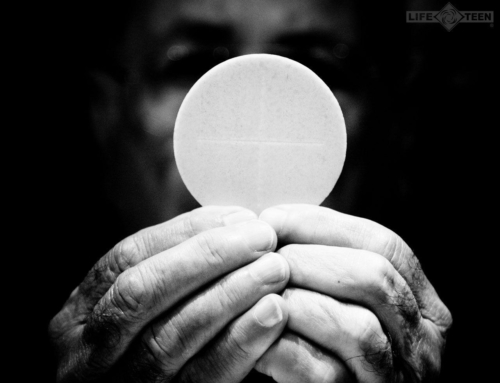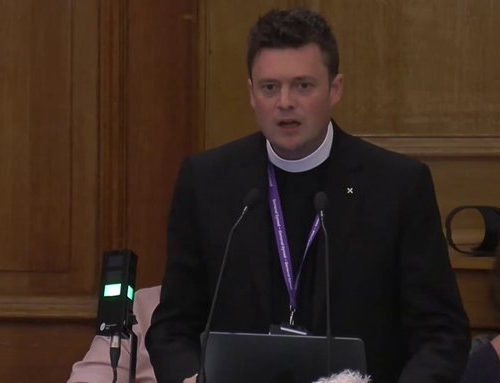Thank you for taking seriously the ministry of serving the Lord’s body and precious blood to the faithful. Your ministry in the liturgy and to the home bound is important to the whole ministry of the church, and I want you to understand that the ministry in which you share is more than just a practical way to “help Father and the deacons.”
As a layperson administering communion, you fulfill a particular function within the symbolism and meaning of the liturgy. You are not just “helping Father.” To be honest, we can do it without you if necessary. In fact, you are called “extraordinary ministers of Holy Communion” because the “ordinary ministers” are properly the priests and deacons. Your ministry is an extension of the ministry of the ordained men, and the details of the liturgy bear this out. So, for example, you receive the ciborium and chalice from the hands of the priest and deacon. You do not come up to the altar and take them yourself.
Extraordinary ministers were introduced as numbers at mass in large churches and the reception of the precious blood became more commonplace. It was increasingly difficult with fewer priests to administer to everyone, especially if they were receiving the precious blood as well as the Body of Christ.
But I think there is more to it than the practical need for assistance. This has come about in the church for practical reasons, but your ministry also incorporates other truths and reveals them through the action of the liturgy.
First of all, along with the altar servers you help to establish an atmosphere of reverence at Mass. Your body language, prayerful attitude and reverent treatment of the sacred vessels, the host and the precious blood helps to support the overall sense of reverence at communion. When the people see you genuflect before the tabernacle and before you receive communion they are reminded of the correct behaviors and proper reverence. Your leadership in prayer and service in the parish is an example to others. That’s one of the reasons you were selected for this ministry–because you help to set a good example. Respect that and do not spoil this sacred trust!
But there is even more than practical help and simply setting a good example for others.
As extraordinary ministers you are sharing in the fullness of Christ’s priestly ministry. In his first epistle St Peter teaches, “you are a chosen people, a royal priesthood, a holy nation, God’s special possession, that you may declare the praises of him who called you out of darkness into his wonderful light.” (I Pt 2:9) By virtue of our baptism each one of us are adopted as God’s children, brothers and sisters of Christ. In the same epistle St Peter teaches that we are sharers in Christ’s divine nature.
His divine power has given us everything we need for a godly life through our knowledge of him who called us by his own glory and goodness. Through these he has given us his very great and precious promises, so that through them you may participate in the divine nature.
The Catechism of the Catholic Church affirms this priestly role of all the faithful:
Jesus Christ is the one whom the Father anointed with the Holy Spirit and established as priest, prophet, and king. The whole People of God participates in these three offices of Christ and bears the responsibilities for mission and service that flow from them.
On entering the People of God through faith and Baptism, one receives a share in this people’s unique, priestly vocation: “Christ the Lord, high priest taken from among men, has made this new people ‘a kingdom of priests to God, his Father.’ The baptized, by regeneration and the anointing of the Holy Spirit, are consecrated to be a spiritual house and a holy priesthood.”(para.793-4)
Your service as extraordinary ministers is a liturgical sign to all the faithful that we share in the divine nature and we share in the eternal priesthood of Christ.
However, as lay people, you share in that priesthood in a different way than the ordained man. The way you serve at Mass indicates the difference. It is right, therefore that you should wear your ordinary clothes to serve. I should mention that your ordinary clothes should be modest, suitable and not draw attention to themselves. I’ll never forget going forward to communion once and the extraordinary minister was wearing a tight black T-shirt emblazoned with the portrait of a demonic looking heavy metal rock musician. Underneath was a slogan saying, “Slasher” or “The Grateful Dead” or some such!
Ordinary, clean, modest and suitable clothes are fine. To put on special robes or medallions is confusing. Wearing ordinary clothes is a sign of the way you fulfill Christ’s priesthood in the world as laypeople. It complements the distinctive dress of the clergy. Their clerical garb and liturgical vestments indicate that they are set apart to fulfill Christ’s priesthood in a distinctive way.
This is also why you normally should not come up into the sanctuary. Instead we come to you, bringing the Body and Blood of Christ. This distinction–with you remaining at the floor level of the church and not entering the sanctuary also reinforces the distinction between clergy and laity. This is not because we priests and deacons are better than you, but because there is a fitting complementarity between our ministries. You represent the church alive and active in the world–serving, evangelizing and ministering from within.
Maintaining this complementarity strengthens and clarifies your ministry and role in the church and also strengthens and clarifies the role of the ordained men. It also reminds all the faithful of their own role in the divine economy. We’re not all supposed to be ordained men. The majority of the baptized serve the church in the world.
This is also why, after communion is finished you hand the sacred vessels back to the clergy and servers and they cleanse them at the altar. In some churches you will see the lay people come up to the altar and stand around the altar to receive the body and blood of Christ. Then after communion they all troop up to the altar and help to cleanse the vessels.
This is not only sloppy and irreverent, but it also destroys the distinctiveness of both our ministries. It blurs the lines, confuses the faithful and leads to misunderstandings about the proper roles within the church.
You may find the other extreme within the Catholic Church too. Some Catholics think Extraordinary Ministers of Holy Communion should be banned. They are probably reacting against the abuses I’ve just spoken about–lots of lay people standing about the altar doing stuff. However, there are some who disagree with Extraordinary Ministers of Holy Communion on more ideological grounds. They think laypeople should never touch the sacred vessels or the sacred host.
This is a sincere, but misguided opinion which lends itself to the kind of clericalism that runs through Catholicism like a pernicious poison. Don’t be daunted by such negative attitudes. Serve the Church in this role with joy, humility and reverence, remembering that your approach to the altar and the way you serve will encourage all the faithful to receive the Lord with simplicity, beauty and true reverence. You are also a reminder to them of their own share in the royal priesthood of Christ in the world.







Great reminder of the balance between extremes of either side. In every seemingly impossible conflict, the Church stands at the center and puts both sides to shame for taking the extreme as the correct.
Where to find the rubrics defining theses” ministers”?